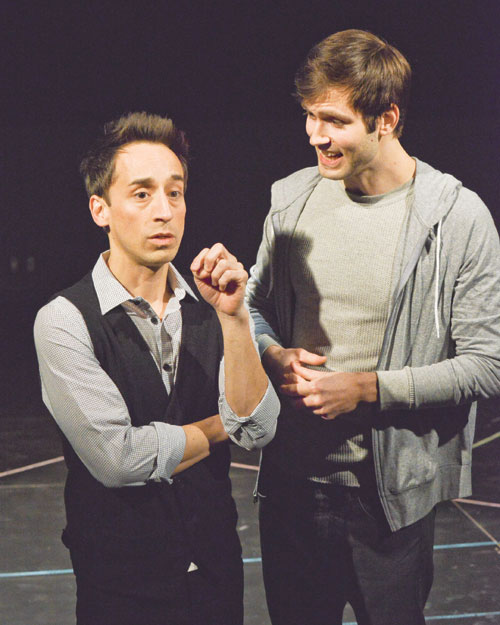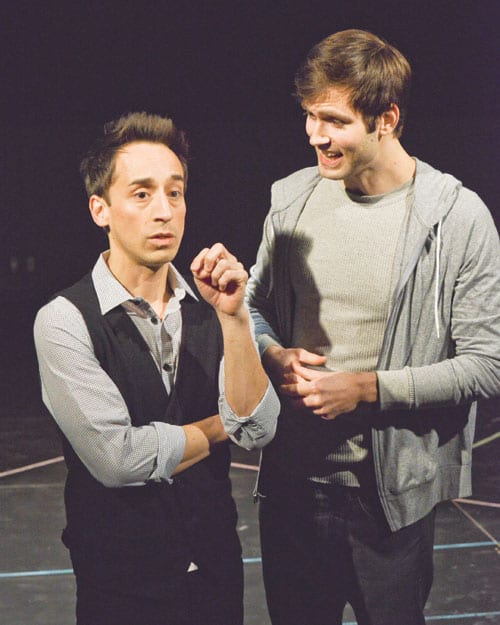Second Thought Theatre opens ‘Cock’ a play about … well, that’s sort of the question

MAY-DECEMBER | Blake Hackler, left, and Justin Locklear play a couple whose age difference isn’t the only barrier to understanding one another in the controversial play ‘Cock.’ (Photo courtesy Karen Almond)
ARNOLD WAYNE JONES | Life+Style Editor
The name a playwright gives to his work can be a game of expectation. Call your play Ghost, people expect to meet a ghost; call your play The Motherfucker with the Hat, and folks expect to see a hat.
So if you call you play Cock …? Well, don’t get your hopes up. There’s not even a rooster in Mike Bartlett’s buzzed-about off-Broadway hit, not to mention full frontal male nudity. In fact, the actors who star in the show, Blake Hackler and Justin Locklear, deny there’s anything at all offensive in this modern comedy.
“I don’t think there’s anything offensive about it,” Hackler says with a quizzical look. “Some theaters even list it [by its alternative title] The Cockfight Play, which is really what it’s about.”
So, not even any naughty words?
“Well, yes, there are naughty words,” Hackler concedes. “And you get to watch people say things [audiences] aren’t used to,” adds Locklear.
It’s all a question of perspective, of course. For some audience members, the play’s very premise — about M (Hackler) and John (Locklear), a long-term gay couple who split up, soon after which John starts to wonder if he might prefer girls — is cause for saying a rosary. Gays? Portrayed as sexually active and (gasp!) normal?!? But, Hackler and Locklear concur, all good plays are about more than just the characters and plot they portray.
“The first time I read about it, it was described as about a man who breaks up with his boyfriend and falls in love with the woman of his dreams, but that’s not really what it’s about … but it is an easy way to explain it to my aunt,” Locklear says.
The major plot complication — M invites John’s female lover (Danielle Pickard) over for a dinner to resolve their love triangle — seems like an ideal way adults would try to address their problems in a civilized manner, but it’s not long before, as in God of Carnage, the gloves come off.
“What it’s really about it that John is unbelievably noncommittal,” Hackler says. John won’t decide whether he’s gay or straight, but “he would bridle at the word ‘bisexual.’” In that way, you could see it as a metaphor for millennials’ notoriously squishy sensibilities.
“I think [the play] definitely touches on what younger people think about sexuality, and how it is vastly different than [older people],” Locklear posits. “I think younger people are trying to reason through it.”
“Do you think so?” jumps in Hackler, who plays the older partner in the relationship. “Do you know a lot of people who are coming out? My experience is they know very clearly who they are. In fact, I think it’s such a cop-out when John says he doesn’t want to be labeled [as gay, straight or bisexual]. I always just want [M] to shout at John, ‘Let’s get to it — her or me?’ It’s not about being gay or straight, it’s about making a decision.”
The kinds of conflicts portrayed aren’t so far removed from their own lives.
“I was dating a [younger] guy last year, and I showed him a clip of Barbra Streisand performing. He said to me, ‘I didn’t know she was a singer — I’ve just seen her movies run on Lifetime,’” Hackler says.
It’s at that point the issue ceases being whether someone is gay or bisexual — he’s just not right for you.
This article appeared in the Dallas Voice print edition January 31, 2014.

